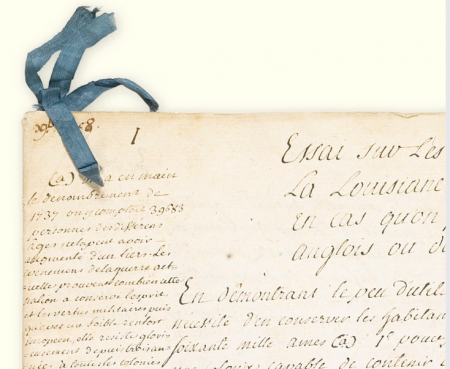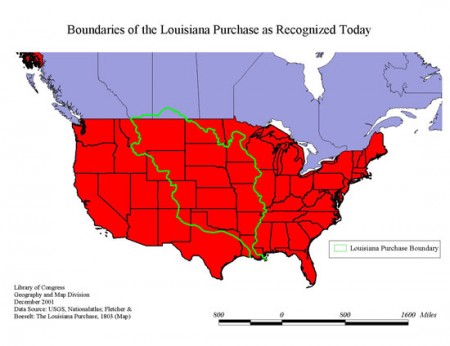1758 Document hints at a very different North America

Screen shot of 1758 document offered as Lot 66 at June 11 Sotheby’s auction in New York City.
There’s a genre of fiction called ‘Alternate history‘.
You know: Abraham Lincoln survived John Wilkes Booth’s assassination attempt or someone managed to kill Hitler before WW II – that sort of thing. Romps that mix what we know did happen with how things could have gone quite differently.
Well, here’s a historical document from 1759 that practically screams ‘write this’.
As reported by Randy Boswel of Postmedia news:
A New York auction house has revealed the discovery of a previously unknown document from a pivotal moment in Canadian history — a hand-written report detailing an “obscure” and startling December 1758 proposal by an unnamed French official to relocate the 60,000 people of New France to Louisiana in the event of a British victory in the Seven Years’ War.
Hmm. If that had happened, the Louisiana Purchase in 1803 would have become less probable. At 4 cents per acre, the total sum of 15 million paid to France was no small chunk of money back in the day. As we all learned in school, that sale enabled the young U.S. to expand westward and incorporate the tremendously important Mississippi River watershed. The Library of Congress calls it the “greatest real estate deal in history”. (Thomas Jefferson basically bought the parts encompassed by the green lines in the map below.)
The 1758 document is among many other items to be offered by Sotheby’s on that date: Fine Books and Manuscripts, including Americana. The estimated price range runs from $100,000 to $150,000 USD.
 I will shamelessly quote from the Sotheby catalog notes, because they are fascinating:
I will shamelessly quote from the Sotheby catalog notes, because they are fascinating:
A previously unknown manuscript account of an obscure French project to relocate some 60,000 French inhabitants of Canada to Louisiana during the French and Indian War. This plan was not known to historians until 1954 when Lionel Grouls published a study of another similar, but shorter, manuscript from the Centre des Archives d’Outre-Mer (C11 A, 103), dated 27 December 1758, in Revue d’Histoire de l’Amérique française(vol. VIII [1954]: 97-118).
The anonymous author details the advantages of such a project: increasing the population of Louisiana; making it a stronger colony, capable of withstanding English encroachment; developing the agriculture of the region; and establishing new trade routes and partners. The author also is adamant that the any émigrés must be persuaded to join the project voluntarily because of the personal advantages to them—they are not to be coerced or forced to move. He actually tabulates twenty-seven points that can be used to convince the settlers to abandon Canada for Louisiana, and he also speculates that camels might be sent to the settlers in their new southern homeland. The movement of settlers is to be preceded by a military convoy, which will then report on how many people can travel at once, as well as the feasibility of traveling on board vessels across the Great Lakes and down the Mississippi River. The author assumes that the entire project would be paid for by Louis XV, but in addition to the enormous logistical problems this project would have faced, the French treasury simply could not have afforded an expenditure on this scale at that time, and the project never developed beyond the proposal stage.
This manuscript is in a clerical hand, and there is no clue to the identity of the actual author, but some possible authors include Colonel Louis Antoine de Bougainville, deputy to General Montcalm; Jean Antoine Nicolas François de Capellis, marquis de Capellis, who wrote several “mémoires” about France’s North American colonies; François-Pierre de Vaudreuil, whose brother had been the French colonial governor of Louisiana and of New France.
Convoys of French to sette the American ‘heartland’! (Louisiana was the whole middle of modern-day America back then, not just Louisiana.)
Camels, oh my! Not to mention how different Canada would be, had the French pulled up and left at that time.
OK, these were just proposals on paper. Implausible, never happened.
But still, it’s amusing imagining it playing out.
Tags: Alternte history, canada, history, Louisiana Purchase, Seven Years' War








This is fascinating and provides an additional wrinkle into the possible play-out of American history — but the truth, of course, is that the French DID settle the American heartland.
After the British conquest of Acadia, thousands of colonists moved to Louisiana. The French established New Orleans, but they also settled Mobile, Alabama, St. Louis, Missouri, Biloxi, Mississippi.
Many of the river towns in the American midwest have French names, a nod to their earliest settlers. I lived for a while on a little farm in Rocheport, Mo.
France just sold them out — and probably would have cheerfully sold out another 60,000 French just as cavalierly.
The weirdest thing that this document highlights is just how TERRIBLE the French were at the colonial game.
Whole books have been written about the disastrous experience of the French in North America.
They began with the strongest, best organized foothold — with strong redoubts and thriving pockets of colonists from New Orleans to Quebec City — and wound up with nothing.
–Brian, NCPR
I thought it was interesting this proposal was to have been pitched as a voluntary migration. (In contrast to the involuntary expulsions easily brought to mind: Acadian Expulsion, Cherokee Trail of Tears, etc.)
Inhumane “herd ’em up, move ’em out” stuff certainly did happen.
The French may have botched colonizing North America, but they still have French Polynesia (though it is described as semi-autonomous).
Wikipedia says the following places are also under control of France’s “Overseas Department” (département d’outre-mer or DOM):
French Guiana in South America
Guadeloupe in North America (the Caribbean)
Martinique in North America (the Caribbean)
Réunion in Africa (the Indian Ocean)
Mayotte in Africa (the Indian Ocean)
MEanwhile, the Brits returned Hong Kong but went to the mat over the Falkland Islands. (No doubt it was easier to take on Argentina than engage in a land war in Asia.)
Colonialism – it lingers still!
Thanks, Brian. I was going to mention Evangeline, a tale of Acadia but you beat me to it.
Speaking of the “what ifs,” what if Mrs. Hitler had an abortion and there was no Adolph?
Had this happened, or something even close, the American patriots might have just swallowed their hubris and helped pay their share for the F-I war, and thereby circumvented the American Revolution. It was, of course, British (blundering) attempts to tax us for the war that led to the outbreak of rebellion and then Independence. But another factor, mentioned in Britain while the war still raged, was that without the French and Indian threat, our ancestors would have no need for the protection of the Mother Country, and, soon enough, that turned into no need of the Mother Country. As it so turned outl
But the specter of 50,000 loyal French in New France, plus their Indian allies might well have thrown an effective damper on Colonial thoughts of Independence. Interesting possibility.
one word, Cajuns.
Interesting, indeed.
Those interested will find Harry Turtledove’s alternative history novels entertaining. He has several threads he develops.